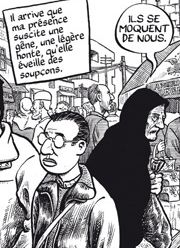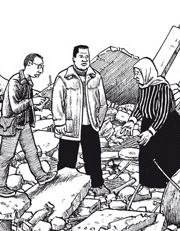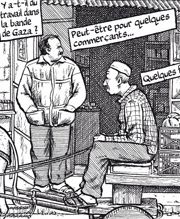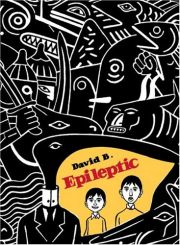Auteurs et autrices / Interview de Joe Sacco (VO)
We meet Joe Sacco on his was to the Angouleme comics festival, as his new book Footnotes in Gaza is published in France. (Read the french version here)

 Hello Joe Sacco, it’s nice to meet you. Could you please introduce yourself briefly for our French readers who may not have heard of you?
Hello Joe Sacco, it’s nice to meet you. Could you please introduce yourself briefly for our French readers who may not have heard of you?
I am a cartoonist and I live in the United States. I’ve done several books… perhaps the first well known one is called Palestine. I did a few books about Bosnia, including a book called Safe Area Gorazde. And I just did a book called footnotes in Gaza… I guess what I primarily have been doing is comics journalism.
 Your new book, “Footnotes in Gaza”, was published a few weeks ago in the US, and has just come out in France. Could you tell us a bit about this project, how it originated etc?
Your new book, “Footnotes in Gaza”, was published a few weeks ago in the US, and has just come out in France. Could you tell us a bit about this project, how it originated etc?
The book is basically about a couple of incidents that took place in Gaza in 1956. I got the idea from a short reference in a UN document that brought up these incidents, but in a very compact summary. These incidents took place during the Suez crisis, and large numbers of Palestinians were killed. The UN document says that the Israeli said that there was resistance by the Palestinians. And the Palestinians say there was no resistance. The idea behind the book is: is it possible to go and speak to the people who actually lived through it to find out what the actual story is?
 To tell the truth in fact?
To tell the truth in fact?
Well I would hope to tell the truth, I mean, like a lot of documentary evidence it doesn’t really say one way or the other what happened. It just gives competing versions and since people are still alive, they remember it and have something to say about it. I thought “let’s hear what they have to say”.
 I know it’s not all about money, but “Footnotes in Gaza” is a mammoth project that spammed over many years… how did you fund it? Do your books sell enough to make this kind of endeavour profitable?
I know it’s not all about money, but “Footnotes in Gaza” is a mammoth project that spammed over many years… how did you fund it? Do your books sell enough to make this kind of endeavour profitable?
Well my first trip to Palestine and my trip to Bosnia were self-financed. I lived on a shoe string. Fortunately for me, those books, over a long period, ended up doing well. So with this new book, I had a publisher who was willing to give me some money to help finance my trip, and even finance some period of time drawing and researching the book. But of course even though for me it was good money initially, the money ran out… because over 7 years, it costs a lot of money to live that long, so at some point I was running out of money. But I am lucky in that I have a good agent who sold the rights, actually to the French. That helped me get through the last few months of the book.

 Have you ever felt criticized for being too biased in your previous publications? You seem to try to be more transparent in “Footnotes in Gaza” (your foreword almost sounds like a disclaimer!)
Have you ever felt criticized for being too biased in your previous publications? You seem to try to be more transparent in “Footnotes in Gaza” (your foreword almost sounds like a disclaimer!)
I don’t really agree, I don’t think my foreword is a disclaimer. I do mention that I am a filter. There is artistic filtering that goes on and that can’t be avoided if you’re drawing.
As to whether my work is sometimes accused of bias, the answer is yes… I have been accused of bias. With this book in particular I am accused of Israel bashing. I didn’t get much flak for my first book, because in those days no one was interested in comics, so when I did the series it flew under the radar, and no one paid that much attention to it. With this book however, I am getting a lot of mainstream media attention, and that means the reaction is going to be a bit stronger.
But yes people do accuse me of that, but, you know, what I am trying to do with this book and my other work is give Palestinians a voice, give them a chance to speak to a western audience. I think what I do is show everything I can about the Palestinians, whether they say something that is rational and to the point and makes sense, or whether they say something that a westerner is going to think is ugly. I don’t want to sugar-coat the Palestinians. But I think my book is fair!

 Your reports are uncompromising, and you never hesitate to point the finger at administrations and individuals from all “sides”. Have you ever felt pressured or threatened for your views, in America or abroad?
Your reports are uncompromising, and you never hesitate to point the finger at administrations and individuals from all “sides”. Have you ever felt pressured or threatened for your views, in America or abroad?
I haven’t. I mean, some of the figures I criticize have been criticized from other quarters. If someone was to notice the book, it probably would do them better to just ignore it, because if you bring attention to the fact that you have been criticized, it’s just going to give more attention to the book and sometimes people don’t want that.
 Why do you choose the graphic novel medium to tell your journalistic work? Do you think it adds to the reading experience? Maybe it’s simply a personal preference? Would you consider yourself a “proper” journalist? Do you think other journalists do?
Why do you choose the graphic novel medium to tell your journalistic work? Do you think it adds to the reading experience? Maybe it’s simply a personal preference? Would you consider yourself a “proper” journalist? Do you think other journalists do?
That’s a lot of questions! I do it this way because I am a cartoonist. I could do it another way perhaps, but this is how I have established a career, and maybe I came to the idea of putting comics and journalism together organically, even accidently. But I studied journalism, I have a degree in journalism, so I feel like I know what I am doing with that.
 Definitely a lot of people think the medium is unusual, but with time… I have done a lot of books and I think I am trusted, people think of me as someone who can do journalism well. Other journalists most always, there’s been a few exceptions, but most always have been very friendly, admiring, even envious of the time I spend with the details and the stories. Because they often have to send out a story every day, and when you send out a story every day, you can’t do something in depth. They probably know too that it’s the stuff that’s in depth that really gives the reader a feeling for what’s going on. I have friends of mine journalists, and no problem with them.
Definitely a lot of people think the medium is unusual, but with time… I have done a lot of books and I think I am trusted, people think of me as someone who can do journalism well. Other journalists most always, there’s been a few exceptions, but most always have been very friendly, admiring, even envious of the time I spend with the details and the stories. Because they often have to send out a story every day, and when you send out a story every day, you can’t do something in depth. They probably know too that it’s the stuff that’s in depth that really gives the reader a feeling for what’s going on. I have friends of mine journalists, and no problem with them.
I don’t know if I’ve answered all your questions, but I think I’ve answered at least 2 or 3 of them! (laughs)
 So do you see yourself as a journalist or a cartoonist?
So do you see yourself as a journalist or a cartoonist?
I am a cartoonist. I studied journalism... I never studied cartooning or art, but I think of myself as a cartoonist. I have done a number of books now that you can say are journalistic, and that’s what I am known for. I feel I behave like a journalist when I am in those situations, trying to get the facts, trying to interview people and get the quotes right. I am trying to be as accurate as possible and I know how to do researching and things like that, so there are certain elements that come into play, but ultimately I do think of myself as a cartoonist because… perhaps I want to do something funny one day, and a journalist is not going to do something funny… I mean, a cartoonist might be able to do something funny!
 Indeed most of the books you are known for are journalistic pieces about war and violence. Do you ever feel like writing more “But I like it” type stories. Maybe even a fictional story?
Indeed most of the books you are known for are journalistic pieces about war and violence. Do you ever feel like writing more “But I like it” type stories. Maybe even a fictional story?
Yes very much so. More so than ever, because I have spent a lot of years working in journalism stories. I enjoy it, and I’ll probably continue, but I want to give myself a creative change, I feel I need it.
 You need a break?
You need a break?
I need a break. But also I have creative ideas that don’t fit as journalism. It might have some elements of it, but I would like very much to try something else.
 So what do you think your next project will be about?
So what do you think your next project will be about?
Well after I said all that, I have just finished a magazine piece, about 48 pages, about African migrants trying to get to Europe. I went to Malta to get that story. And it looks like I’ll go to India in a few weeks to do a story there. But after that, who knows, I’m just going to give myself a bit of time to think about it. I have some ideas but I need to think about them a little more before I tell you what they are.

 Finally, a traditional question for our non-French interviewees: do you know much about our “bande dessinée” industry?
Finally, a traditional question for our non-French interviewees: do you know much about our “bande dessinée” industry?
I know some about the French market. In fact I probably know more about the French market and French cartoonists than any other national group of cartoonists. Simply because in America, people like Marjane Satrapi, David B., Emmanuel Guibert have got mainstream attention, and are well regarded, as are many other French cartoonists.
I think there is kind of a bond between American and French cartoonists, in terms of the independent black and white scene for example. I think we are influencing each other at this point. Sometimes I think that the dialogue is really between the French and the Americans when it comes to comics. Others are involved, but I know more French cartoonists than of any other nationalities. I admire the work, and I am always learning about new talents, I am always finding out something else. I am surprised by the amount of talent… people here really know how to draw!
 Have you ever been to a French BD festival before?
Have you ever been to a French BD festival before?
I’ve been to Angouleme two times. Maybe I’ve been to other French events but I can’t remember… but I’ve definitely been to Angouleme a couple of times though!
 Thanks a lot for talking to us, and for all your wonderful books!
Thanks a lot for talking to us, and for all your wonderful books!
Thanks very much, it was a pleasure to talk to you.
Site réalisé avec CodeIgniter, jQuery, Bootstrap, fancyBox, Open Iconic, typeahead.js, Google Charts, Google Maps, echo
Copyright © 2001 - 2024 BDTheque | Contact | Les cookies sur le site | Les stats du site
